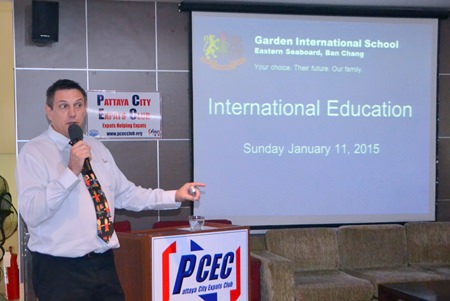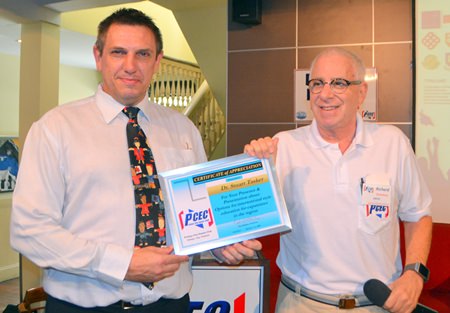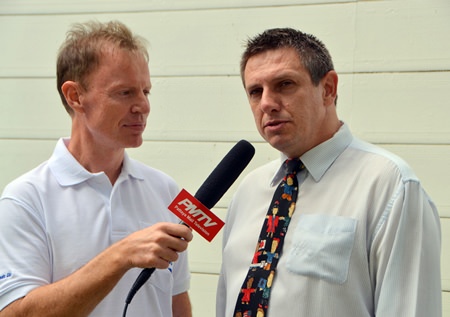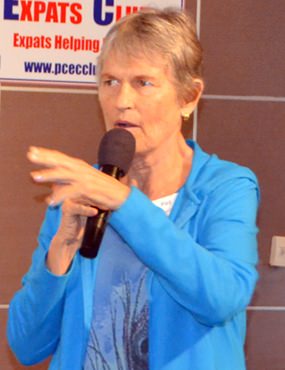Quality in education can be costly. The cost of sending children to an international school in Thailand is not cheap; but the quality of education is generally very high. This was the message from Dr. Stuart Tasker who spoke to the Pattaya City Expats Club on Sunday, January 11. Stuart is in his third year as the Principal of the Garden International School in Ban Chang, about halfway between Pattaya and Rayong. Previously he was Headmaster for six years at an independent school in Auckland, New Zealand. He has taught primarily mathematics, physics and science during his teaching career. He also played football to a national (junior) level in New Zealand and has a black belt in karate. For more information on the Garden International School, visit http://www.gardenrayong.com/.
He began by giving an overview of the requirements for an international school to operate in Thailand. Thailand has two agencies that oversee international schools; they are the Office of the Private Education Commission in the Ministry of Education, which has strict guidelines for international schools. There is also an Office for National Educational Education Standards and Quality Assessment (ONESQA), a public organization, which inspects all schools in Thailand, both Thai and international.
 Dr. Stuart Tasker, Principal at Garden International School, explains to his PCEC audience the educational standards required and types of curriculum offered by international schools in Thailand.
Dr. Stuart Tasker, Principal at Garden International School, explains to his PCEC audience the educational standards required and types of curriculum offered by international schools in Thailand.
All international schools in Thailand must have a valid external accreditation from one of four international agencies: the Western Association of Schools and Colleges; the New England Association of Schools and Colleges; the Centre for British Teachers; or the Council for International Schools. Garden International School is accredited by the Council for International Schools. Two other international schools familiar to Pattaya residents – Regents and St. Andrews – are accredited by the Centre for British Teachers.
 MC Richard Silverberg presents the PCEC’s Certificate of Appreciation to Dr. Stuart Tasker for his interesting and informative talk about the educational benefit of attending international schools in Thailand.
MC Richard Silverberg presents the PCEC’s Certificate of Appreciation to Dr. Stuart Tasker for his interesting and informative talk about the educational benefit of attending international schools in Thailand.
International schools can join ISAT – the International Schools Association of Thailand – which lobbies the Ministry of Education on behalf of international schools. ISAT is not an accreditation agency and it does not do inspections. According to Wikipedia, there were 136 international schools in Thailand as of 2011. Stuart said that there are about 100 international schools in Bangkok alone.
Most international schools teach in English (except for Thai language classes) and follow primarily either a British or American curriculum. However, there are some international schools that teach in other languages, such as Japanese, French and German.
 Ren Lexander interviews Dr. Tasker for Pattaya Mail TV about his presentation to the PCEC. The interview can be seen at: https://www.youtube.com/watch?v=aOrFgvSHQNg
Ren Lexander interviews Dr. Tasker for Pattaya Mail TV about his presentation to the PCEC. The interview can be seen at: https://www.youtube.com/watch?v=aOrFgvSHQNg
Most of the international schools are for-profit ventures. Stuart explained that the company that owns the Garden International School, MGf Taylors, is not interested in making a profit from the school, so any money left over at the end of the year is poured back into the school. The cost to send students to international schools is high. At Garden International School, the cost ranges from 90,000 to 220,000 baht each term (there are two terms a year).
 PCEC Club member Pat Koester describes the upcoming tour to the “Switzerland of Issan” she is organizing for PCEC members and friends for February 6 and 7. Pat notes that a deposit will be required as the Travel Agency will need it to book the hotel rooms in advance.
PCEC Club member Pat Koester describes the upcoming tour to the “Switzerland of Issan” she is organizing for PCEC members and friends for February 6 and 7. Pat notes that a deposit will be required as the Travel Agency will need it to book the hotel rooms in advance.
Stuart said that there is an English Programme School in Rayong that is a halfway model: Five core subjects are taught in both English and Thai.
There are approximately 500 children at Garden International School. There are boarding facilities for up to 16 kids. The students come from 40 different countries; some of them do not speak English, which is a challenge both for the students and the school, Stuart explained. The school provides intense English language instruction for these students. About a quarter of the students at the school are “full-Thai” and another quarter are half-Thai.
Garden International School follows the British curriculum through primary school and up to Year 9 (as do Regents and St. Andrews). However, Stuart said, the school can vary the curriculum to take into account the fact that it is situated in Thailand. For example, it can offer a course on Thai history in place of a course on medieval British history.
For Years 10 and 11, the curriculum is based on what is needed to pass the Cambridge International Examinations (CIE). The IGCSE – the International General Certificate of Secondary Education – is an internationally recognised and respected qualification awarded by CIE. The IGCSEs are the most popular international qualifications for 14-16-year-olds in the world, Stuart said. They are taken in almost 150 countries and about 3,000 schools.
At Garden International School, students normally study 5 to 8 IGCSE subjects in Years 10 and 11. English, mathematics and science are compulsory subjects. Optional subjects include arts and design, business studies, geography, history, music, drama and languages. The IGCSE assessment is based on final exams, speaking and listening tests and course work.
In 2013, Garden International School had two female students who achieved great distinction – Sarah finished No. 1 in Thailand for the IGCSE combined science course. And Yeen was No. 1 in the world for the IGCSE Thai language course.
Garden International School also offers an international baccalaureate diploma programme for Years 12 and 13. This is a very rigorous programme that prepares students for entry into universities and colleges around the world. Students are required to choose subjects from each of six groups: language and literature, language acquisition, individuals and societies, sciences, mathematics, and the arts. Students must also devote 120 hours of personal time to creative endeavours, physical activity and providing community services. The goal is to teach students to be (among other things) inquisitive, reflective and open-minded.
Garden International School is a member of the Federation of British International Schools in Asia. This provides opportunities for exchanges among the schools in the federation and for common events like music festivals.
MC Richard Silverberg brought everyone up to date on upcoming events and called on Roy Albiston to conduct the Open Forum, where questions are asked and answered about expat living in Thailand, especially Pattaya.
For more information on the PCEC’s many activities, visit their website at www.pcecclub.org.




